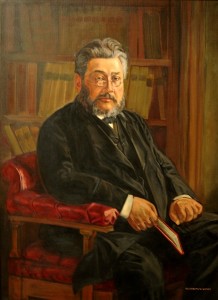 The sixty-six books of the Protestant canon, in their original writings, comprise the verbally inspired, inerrant Word of God. The thirty-nine books known as the Hebrew Old Testament are God-breathed, products of the Holy Spirit’s inspiration, and thus free from error in all that they affirm (cf. Deuteronomy 18:18, 19; Psalms 19:7, 8; 119:89, 142, 151, 160; Matthew 5:17-19; John 10:35; 2 Timothy 3:16; 2 Peter 1:20, 21). Similarly, the twenty-seven books known as the Greek New Testament are the eternally abiding words of Jesus Christ (Matthew 24:35), and are thus the words of God (John 7:16; 12:49). The Holy Spirit enabled the writers both to recall what the Lord said (John 14:26), and to continue to receive His revelation (John 16: 12-15). As a result, the writings of the New Testament are the commandment of the Lord (1 Corinthians 14:37), are Scripture (2 Peter 3:15, 16), and are God-breathed (2 Timothy 3:16). For this reason, the sinner finds the way of salvation through Scripture (Romans 10:17; 2 Timothy 3:15; Hebrews 2: 1-3). The believer is made fruitful (Psalm 1:2, 3) and successful in the will of God (Joshua 1:8), warned and kept from sin (Psalms 19:11; 119:9,11), made holy (John 17:17), given wisdom (Psalm 9:7) and freeing knowledge of the truth (John 8: 31, 32), taught the fear of God (Psalm 119:38), counseled (Psalm 119:24), taught, reproved, corrected, and disciplined in the way righteousness (2 Timothy 3:16) by Scripture. Scripture is, in short, the fully adequate revelation of the person, ways, and will of God, the only infallible rule of faith for the people of God.
The sixty-six books of the Protestant canon, in their original writings, comprise the verbally inspired, inerrant Word of God. The thirty-nine books known as the Hebrew Old Testament are God-breathed, products of the Holy Spirit’s inspiration, and thus free from error in all that they affirm (cf. Deuteronomy 18:18, 19; Psalms 19:7, 8; 119:89, 142, 151, 160; Matthew 5:17-19; John 10:35; 2 Timothy 3:16; 2 Peter 1:20, 21). Similarly, the twenty-seven books known as the Greek New Testament are the eternally abiding words of Jesus Christ (Matthew 24:35), and are thus the words of God (John 7:16; 12:49). The Holy Spirit enabled the writers both to recall what the Lord said (John 14:26), and to continue to receive His revelation (John 16: 12-15). As a result, the writings of the New Testament are the commandment of the Lord (1 Corinthians 14:37), are Scripture (2 Peter 3:15, 16), and are God-breathed (2 Timothy 3:16). For this reason, the sinner finds the way of salvation through Scripture (Romans 10:17; 2 Timothy 3:15; Hebrews 2: 1-3). The believer is made fruitful (Psalm 1:2, 3) and successful in the will of God (Joshua 1:8), warned and kept from sin (Psalms 19:11; 119:9,11), made holy (John 17:17), given wisdom (Psalm 9:7) and freeing knowledge of the truth (John 8: 31, 32), taught the fear of God (Psalm 119:38), counseled (Psalm 119:24), taught, reproved, corrected, and disciplined in the way righteousness (2 Timothy 3:16) by Scripture. Scripture is, in short, the fully adequate revelation of the person, ways, and will of God, the only infallible rule of faith for the people of God.
Category Archives: Bible Reflection
Jesus’ View of Scripture
 Kevin DeYoung:
Kevin DeYoung:
Jesus held Scripture in the highest possible esteem. He knew his Bible intimately and loved it deeply. He often spoke with language of Scripture. He easily alluded to Scripture. And in his moments of greatest trial and weakness—like being tempted by the devil or being killed on a cross—he quoted Scripture.
His mission was to fulfill Scripture, never disregarded, never disagreed with a single text of Scripture.
He affirmed every bit of law, prophecy, narrative, and poetry. He shuddered to think of anyone anywhere violating, ignoring, or rejecting Scripture.
Jesus believed in the inspiration of Scripture, down to the sentences, to the phrases, to the words, to the smallest letter, to the tiniest mark.
He accepted the chronology, the miracles, and the authorial ascriptions as giving the straightforward facts of history.
He believed in keeping the spirit of the law without ever minimizing the letter of the law. He affirmed the human authorship of Scripture while at the same time bearing witness to the ultimate divine authorship of the Scriptures.
He treated the Bible as a necessary word, a sufficient word, a clear word, and the final word.
It was never acceptable in his mind to contradict Scripture or stand above Scripture.
He believed the Bible was all true, all edifying, all important, and all about him. He believed absolutely that the Bible was from God and was absolutely free from error. What Scripture says God says, and what God said was recorded infallibly in Scripture.
Jesus submitted his will to the Scriptures, committed his brain to study the Scriptures, and humbled his heart to obey the Scriptures.
In summary, it is impossible to revere the Scriptures more deeply or affirm them more completely than Jesus did. The Lord Jesus, God’s Son and our Savior, believed his Bible was the word of God down to the tiniest speck and that nothing in all those specks and in all those books in his Bible could ever be broken.
Spurgeon on 1 John 5:1
 Charles Spurgeon preaching on 1 John 5:1 makes the point that men believe, not of their own power, but as a result of the work of regeneration in the hearts of men:
Charles Spurgeon preaching on 1 John 5:1 makes the point that men believe, not of their own power, but as a result of the work of regeneration in the hearts of men:
We must now pass on to show that wherever it exists it is the proof of regeneration. There never was a grain of such faith as this in the world, except in a regenerate soul, and there never will be while the world standeth. It is so according to the text, and if we had no other testimony this one passage would be quite enough to prove it. “Whosoever believeth that Jesus is the Christ is born of God.”
“Ah!” I hear thee say, poor soul, “the new birth is a great mystery; I do not understand it; I am afraid I am not a partaker in it.”
You are born again if you believe that Jesus is the Christ, if you are relying upon a crucified Saviour you are assuredly begotten again unto a lively hope. Mystery or no mystery, the new birth is yours if you are a believer. Have you never noticed that the greatest mysteries in the world reveal themselves by the simplest indications.
The simplicity and apparent easiness of faith is no reason why I should not regard its existence as an infallible indication of the new birth within. How know we that the new-born child lives except by its cry? Yet a child’s cry—what a simple sound it is! how readily could it be imitated! a clever workman could with pipes and strings easily deceive us; yet was there never a child’s cry in the world but what it indicated the mysteries of breathing, heart-beating, blood-flowing, and all the other wonders which come with life itself.
Do you see yonder person just drawn out of the river? Does she live? Yes, life is there.
Why?
Because the lungs still heave.
But does it not seem an easy thing to make lungs heave? A pair of billows blown into them, might not that produce the motion?
Ah, yes, the thing is easily imitated after a sort; but no lungs heave except where life is. Take another illustration.
Go into a telegraph office at any time, and you will see certain needles moving right and left with unceasing click. Electricity is a great mystery, and you cannot see or feel it; but the operator tells you that the electric current is moving along the wire.
How does he know?
“I know it by the needle.”
How is that?
I could move your needles easily.
“Yes; but do not you see the needle has made two motions to the right, one to the left, and two to the right again? I am reading a message.”
“But,” say you, “I can see nothing in it; I could imitate the clicking and moving very easily.”
Yet he who is taught the art sees before him in those needles, not only electric action, but a deeper mystery still; he perceives that a mind is directing an invisible force, and speaking by means of it.
Not to all, but to the initiated is it given to see the mystery hidden within the simplicity. The believer sees in the faith, which is simple as the movements of the needle, an indication that God is operating on the human mind, and the spiritual man discerns that there is an inner secret intimated thereby, which the carnal eye cannot decipher.
To believe in Jesus is a better indicator of regeneration than anything else, and in no case did it ever mislead. Faith in the living God and his Son Jesus Christ is always the result of the new birth, and can never exist except in the regenerate. Whoever has faith is a saved man.
HT: Mike Porter
